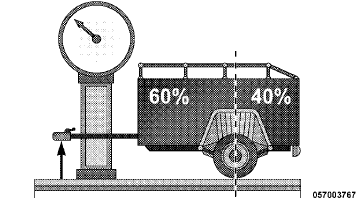Trailer And Tongue Weight
Always load a trailer with 60% to 65% of the weight in the front of the trailer. This places 10% to 15% of the Gross Trailer Weight (GTW) on the tow hitch of your vehicle. Loads balanced over the wheels or heavier in the rear can cause the trailer to sway severely side-to-side which will cause loss of control of vehicle and trailer.
Failure to load trailers heavier in front is the cause of many trailer collisions.

Consider the following items when computing the weight on the rear axle of the vehicle:
• The trailer tongue weight.
• The weight of any other type of cargo or equipment put in or on your vehicle.
• The weight of the driver and all passengers.
NOTE: Remember that everything put into or on the trailer adds to the load on your vehicle. Also, additional factory-installed options, or authorized dealer-installed options, must be considered as part of the total load on your vehicle. Refer to the “Tire Safety Information/Tire and Loading Information Placard” in “Starting and Operating” for the maximum combined weight of occupants and cargo for your vehicle.
See also:
Media Center 130 With Satellite Radio (Sales Code RES+RSC).
NOTE: The radio sales code is located on the lower right side of the radio
faceplate.
Media Center 130 (RES/RSC) ...
Before You Begin Programming HomeLink
Be sure that your vehicle is parked outside of the garage
before you begin programming.
For more efficient programming and accurate transmission
of the radio-frequency signal it is recommended th ...
Remote Start Abort Message On Electronic Vehicle Information Center (EVIC) —
If Equipped
The following messages will display in the EVIC if the
vehicle fails to remote start or exits remote start prematurely:
• Remote Start Aborted — Door Ajar
• Remote Start Aborted — Hood A ...


